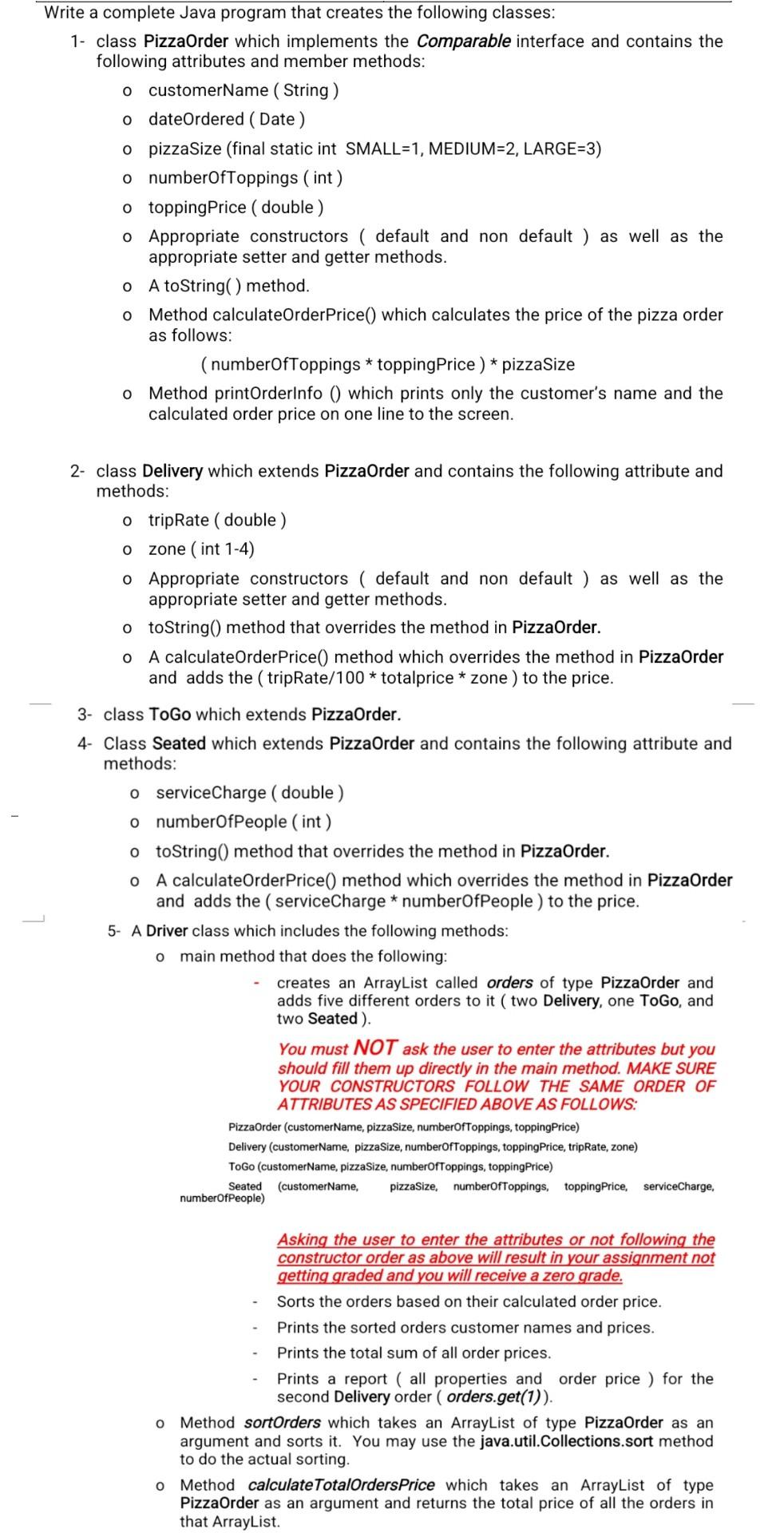Question
Write a complete Java program that creates the following classes: 1- class PizzaOrder which implements the Comparable interface and contains the following attributes and member
Write a complete Java program that creates the following classes: 1- class PizzaOrder which implements the Comparable interface and contains the following attributes and member methods: o customerName ( String ) o dateOrdered ( Date ) o pizzaSize (final static int SMALL=1, MEDIUM=2, LARGE=3) o numberOfToppings ( int ) o toppingPrice ( double ) o Appropriate constructors ( default and non default ) as well as the appropriate setter and getter methods. o A toString( ) method. o Method calculateOrderPrice() which calculates the price of the pizza order as follows: ( numberOfToppings * toppingPrice ) * pizzaSize o Method printOrderInfo () which prints only the customers name and the calculated order price on one line to the screen. 2- class Delivery which extends PizzaOrder and contains the following attribute and methods: o tripRate ( double ) o zone ( int 1-4) o Appropriate constructors ( default and non default ) as well as the appropriate setter and getter methods. o toString() method that overrides the method in PizzaOrder. o A calculateOrderPrice() method which overrides the method in PizzaOrder and adds the ( tripRate/100 * totalprice * zone ) to the price. 3- class ToGo which extends PizzaOrder. 4- Class Seated which extends PizzaOrder and contains the following attribute and methods: o serviceCharge ( double ) o numberOfPeople ( int ) o toString() method that overrides the method in PizzaOrder. o A calculateOrderPrice() method which overrides the method in PizzaOrder and adds the ( serviceCharge * numberOfPeople ) to the price. 5- A Driver class which includes the following methods: o main method that does the following: - creates an ArrayList called orders of type PizzaOrder and adds five different orders to it ( two Delivery, one ToGo, and two Seated ). You must NOT ask the user to enter the attributes but you should fill them up directly in the main method. MAKE SURE YOUR CONSTRUCTORS FOLLOW THE SAME ORDER OF ATTRIBUTES AS SPECIFIED ABOVE AS FOLLOWS: PizzaOrder (customerName, pizzaSize, numberOfToppings, toppingPrice) Delivery (customerName, pizzaSize, numberOfToppings, toppingPrice, tripRate, zone) ToGo (customerName, pizzaSize, numberOfToppings, toppingPrice) Seated (customerName, pizzaSize, numberOfToppings, toppingPrice, serviceCharge, numberOfPeople) Asking the user to enter the attributes or not following the constructor order as above will result in your assignment not getting graded and you will receive a zero grade. - Sorts the orders based on their calculated order price. - Prints the sorted orders customer names and prices. - Prints the total sum of all order prices. - Prints a report ( all properties and order price ) for the second Delivery order ( orders.get(1) ). o Method sortOrders which takes an ArrayList of type PizzaOrder as an argument and sorts it. You may use the java.util.Collections.sort method to do the actual sorting. o Method calculateTotalOrdersPrice which takes an ArrayList of type PizzaOrder as an argument and returns the total price of all the orders in that ArrayList.

Write a complete Java program that creates the following classes: 1- class PizzaOrder which implements the Comparable interface and contains the following attributes and member methods: o customerName ( String) - dateOrdered ( Date ) - pizzaSize (final static int SMALL=1, MEDIUM=2, LARGE=3) - numberOfToppings (int) - toppingPrice ( double ) - Appropriate constructors ( default and non default ) as well as the appropriate setter and getter methods. o A toString ( ) method. - Method calculateOrderPrice() which calculates the price of the pizza order as follows: (numberOfToppings * toppingPrice ) * pizzaSize - Method printOrderInfo () which prints only the customer's name and the calculated order price on one line to the screen. 2- class Delivery which extends PizzaOrder and contains the following attribute and methods: o tripRate (double ) o zone (int 1-4) - Appropriate constructors ( default and non default ) as well as the appropriate setter and getter methods. o toString() method that overrides the method in PizzaOrder. - A calculateOrderPrice() method which overrides the method in PizzaOrder and adds the ( tripRate/100 * totalprice * zone ) to the price. 3- class ToGo which extends PizzaOrder. 4- Class Seated which extends PizzaOrder and contains the following attribute and methods: o serviceCharge ( double ) - numberOfPeople (int) o toString() method that overrides the method in PizzaOrder. - A calculateOrderPrice() method which overrides the method in PizzaOrder and adds the ( serviceCharge * numberOfPeople ) to the price. 5- A Driver class which includes the following methods: - main method that does the following: - creates an ArrayList called orders of type PizzaOrder and adds five different orders to it ( two Delivery, one ToGo, and two Seated ). You must NOT ask the user to enter the attributes but you should fill them up directly in the main method. MAKE SURE YOUR CONSTRUCTORS FOLLOW THE SAME ORDER OF ATTRIBUTES AS SPECIFIED ABOVE AS FOLLOWS: PizzaOrder (customerName, pizzaSize, numberofToppings, toppingPrice) Delivery (customerName, pizzaSize, numberOfToppings, toppingPrice, tripRate, zone) ToGo (customerName, pizzaSize, numberOfToppings, toppingPrice) Seated numberOfPeople) Asking the user to enter the attributes or not following the constructor order as above will result in your assignment not getting graded and you will receive a zero grade. - Sorts the orders based on their calculated order price. - Prints the sorted orders customer names and prices. - Prints the total sum of all order prices. - Prints a report ( all properties and order price ) for the second Delivery order ( orders.get(1)). - Method sortorders which takes an ArrayList of type PizzaOrder as an argument and sorts it. You may use the java.util.Collections.sort method to do the actual sorting. - Method calculateTotalOrdersPrice which takes an ArrayList of type PizzaOrder as an argument and returns the total price of all the orders in that ArrayList
Step by Step Solution
There are 3 Steps involved in it
Step: 1

Get Instant Access to Expert-Tailored Solutions
See step-by-step solutions with expert insights and AI powered tools for academic success
Step: 2

Step: 3

Ace Your Homework with AI
Get the answers you need in no time with our AI-driven, step-by-step assistance
Get Started


